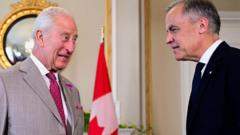The warmth of King Charles III and Queen Camilla's arrival in Ottawa marks a significant moment for Canada, especially as they prepare to make a historic address in parliament on Tuesday. The anticipated speech, coming as the nation navigates a complex relationship with U.S. President Donald Trump, aims to reaffirm Canada's sovereignty and distinct identity.
Shortly after landing, the royal couple was greeted with enthusiasm, reflecting a public desire for reinforcement of national values amidst external pressures. During his visit, the King held crucial discussions with Prime Minister Mark Carney, who recently secured election victory by championing anti-Trump sentiments. Carney emphasized Canada's resilient ties with its constitutional monarchy, underscoring the need for unity in tough times.
In this unprecedented event—the first throne speech delivered by a monarch in nearly half a century—King Charles is set to convey a powerful message that Canada stands firm against becoming a part of the United States. His multi-lingual address, crafted with input from the Canadian government, succinctly captures a nation declaring, "not for sale."
Civic engagement has also featured prominently during the King's visit, as he embraced the opportunity to connect with community members. His participation in local events, including a tree-planting ceremony and engaging with indigenous leaders, added tangible warmth to a political statement. Attendees viewed his presence as critical to the Canadian psyche, with citizens expressing that the King’s solidarity offers reassurance in uncertain times.
In the background of these diplomatic gestures, the delicate balance of his role looms large—representing Canada while maintaining favorable relations with the U.S. However, for many Canadians, the heart of this visit symbolizes an enduring commitment to national independence and self-determination within a complex geopolitical landscape.
Shortly after landing, the royal couple was greeted with enthusiasm, reflecting a public desire for reinforcement of national values amidst external pressures. During his visit, the King held crucial discussions with Prime Minister Mark Carney, who recently secured election victory by championing anti-Trump sentiments. Carney emphasized Canada's resilient ties with its constitutional monarchy, underscoring the need for unity in tough times.
In this unprecedented event—the first throne speech delivered by a monarch in nearly half a century—King Charles is set to convey a powerful message that Canada stands firm against becoming a part of the United States. His multi-lingual address, crafted with input from the Canadian government, succinctly captures a nation declaring, "not for sale."
Civic engagement has also featured prominently during the King's visit, as he embraced the opportunity to connect with community members. His participation in local events, including a tree-planting ceremony and engaging with indigenous leaders, added tangible warmth to a political statement. Attendees viewed his presence as critical to the Canadian psyche, with citizens expressing that the King’s solidarity offers reassurance in uncertain times.
In the background of these diplomatic gestures, the delicate balance of his role looms large—representing Canada while maintaining favorable relations with the U.S. However, for many Canadians, the heart of this visit symbolizes an enduring commitment to national independence and self-determination within a complex geopolitical landscape.



















